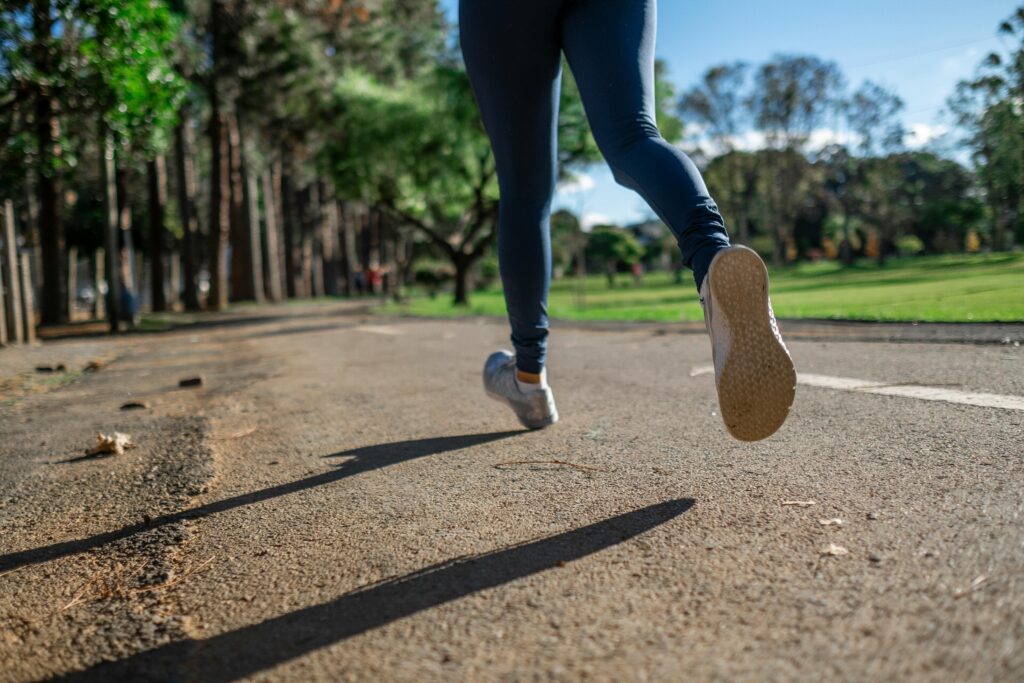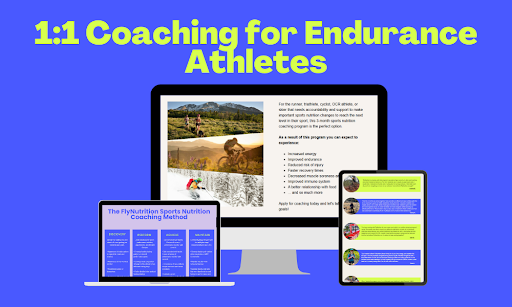Are you giving your body the right nutrients to sustain your endurance goals? If you’re logging miles, crushing workouts, and pushing your limits, but still feeling sluggish or struggling with recovery, the answer might be simpler than you think.
The specific vitamins, minerals, and macronutrients that fuel peak performance, are often the missing piece in many endurance athletes’ nutrition puzzle.
Unlike recreational exercisers, endurance athletes have dramatically higher nutrient needs due to increased energy expenditure, sweat losses, and the constant demands of training and recovery.
Getting your nutrients dialed in isn’t about following the latest superfood trend or popping handfuls of supplements.
It’s about understanding what your body actually needs to perform, recover, and stay healthy through months and years of consistent training.
In this blog post, we’ll break down the essential nutrients every endurance athlete needs, explore common deficiencies like iron deficiency in runners, and give you practical strategies for building a balanced diet that supports your performance goals.

What Are Athletic Nutrients?
Athletic nutrients encompass both macronutrients (carbohydrates, protein, and fat) and micronutrients (vitamins and minerals) that support athletic performance, recovery, and overall health.
But here’s the key difference: endurance athletes need these nutrients in different amounts and at different times compared to sedentary individuals.
What makes these nutrients ‘athletic’ is the emphasis on strategic timing, optimal ratios, and matching intake to your specific training demands. When you’re running 50+ miles per week, cycling for hours, or training twice daily, your nutrient needs skyrocket.
These nutrients work synergistically. You can’t just focus on one or two and expect optimal results.
For example, iron helps deliver oxygen to working muscles, but without adequate B vitamins, your body can’t efficiently produce energy from that oxygen. Carbohydrates provide immediate fuel, but without enough protein, you can’t rebuild the muscle tissue broken down during training.
The most successful endurance athletes I work with understand this interconnected approach to nutrition. They don’t just eat “healthy”—they eat strategically to support their specific training goals.
Macronutrients That Power Endurance Athletes
The foundation of any balanced diet for runners and other endurance athletes starts with getting your macronutrient ratios right.
But unlike general health recommendations, endurance athletes need to prioritize these nutrients differently. Here’s how:
- Carbohydrate needs should be anywhere from 3-12 grams per kilogram of bodyweight for endurance athletes. They’re your body’s preferred fuel source during moderate to high-intensity exercise, and they’re essential for maintaining glycogen stores in your muscles and liver. Without adequate carbs, you’ll struggle to maintain pace, recover between sessions, and feel chronically fatigued.
- Protein needs jump to 1.2-2.2 grams per kilogram of body weight for endurance athletes, nearly double the recommendation for sedentary individuals. Protein isn’t just for muscle building; it’s crucial for repairing the microscopic muscle damage that occurs during every training session. It also supports immune function, which takes a hit during heavy training periods.
- Fats should come in at 0.8-1.4 grams per kilogram body weight for endurance athletes.. While carbs fuel your high-intensity efforts, fats provide sustained energy during longer, moderate-intensity sessions. They’re also essential for hormone production, including testosterone and estrogen, which can be suppressed in athletes who don’t eat enough of it.
Micronutrients Endurance Athletes Can’t Afford to Miss
While macronutrients provide the energy, micronutrients make that energy usable. Certain vitamins and minerals become critically important for endurance athletes due to increased losses through sweat, higher metabolic demands, and the stress of training.
Iron deficiency in runners is incredibly common, especially among female athletes. Iron is essential for oxygen transport via hemoglobin and for energy production within your cells.
When you’re iron deficient, every training session feels harder because your muscles literally can’t access the oxygen they need to perform.
Symptoms of iron deficiency in runners include:
- Persistent fatigue that doesn’t improve with rest
- Shortness of breath during normally manageable efforts
- Poor recovery between workouts
- Increased susceptibility to illness
- Restless leg syndrome or unusual ice cravings
Female endurance athletes are at particularly high risk due to menstrual losses combined with the increased iron demands of training. Plant-based athletes also need to be more vigilant, as non-heme iron from plants is less readily absorbed than heme iron from animal sources.
To learn more about iron deficiency, read our blog post Lack of Iron Symptoms: What Endurance Athletes Need to Know.
Vitamin D deficiency is another silent performance killer. Beyond bone health, vitamin D plays crucial roles in muscle function, immune regulation, and inflammation control. Athletes training indoors or living in northern climates are at higher risk of vitamin D deficiency.
B vitamins, particularly B12, thiamine, and folate, are essential for energy metabolism. Deficiencies can manifest as fatigue, poor recovery, and decreased training capacity. B12 deficiency is especially common in plant-based athletes.
Magnesium and calcium work together for proper muscle contraction and relaxation. Magnesium deficiency can contribute to muscle cramps, poor sleep quality, and increased injury risk which are all common complaints among endurance athletes.
The key is getting these nutrients from whole food sources when possible, as they’re often better absorbed and come packaged with other beneficial compounds.
However, strategic supplementation may be necessary, especially for nutrients like vitamin D, B12 (for plant-based athletes), or iron (if deficiency is confirmed through testing).Read our blog post The Ultimate Guide to Sports Nutrition Supplements for Endurance Athletes to help get your supplementation dialed in.

Hydration and Electrolyte Balance
Proper hydration goes far beyond just drinking water. Endurance athletes lose significant amounts of electrolytes through sweat, and these need to be strategically replaced to maintain performance and prevent complications.
Sodium is the most important electrolyte to replace during and after exercise. The average endurance athlete loses 300-700mg of sodium per hour through sweat, though individual variations can be huge. Some athletes are “salty sweaters” who lose over 1000mg per hour, while others are more conservative salt losers.
Signs of electrolyte imbalance include:
- Muscle cramping
- Fatigue that seems disproportionate to effort
- Headaches
- Nausea
- Confusion or altered mental status (in severe cases)
These symptoms often get misattributed to “just being tired” when they’re actually preventable through proper electrolyte management.
Electrolyte drinks for athletes can be incredibly useful, but not all products are created equal. Many commercial sports drinks are formulated for moderate exercise, not the sustained high sweat rates of serious endurance training.
Look for products that provide 200-700mg of sodium per serving, along with potassium and magnesium.
For longer sessions (over 2-3 hours), you might need multiple bottles of electrolyte solution or additional sodium through foods like salted nuts, pretzels, or specialized electrolyte supplements. The key is experimenting during training to find what works for your individual sweat rate and taste preferences.
Electrolyte drinks for athletes work best when consumed consistently throughout exercise rather than waiting until you feel thirsty or crampy. By the time symptoms appear, you’re already behind on replacement.
If you want to learn more about hydration and sweat testing, check out my Endurance Fueling Playbook here!
Recovery Nutrition for Endurance Athletes
What you eat immediately after training can make or break your next session. Recovery nutrition for endurance athletes is about strategically timing nutrients to maximize adaptations while preparing your body for the next challenge.
The golden window for recovery nutrition for endurance athletes is within 30-60 minutes post-exercise, when your muscles are most receptive to nutrient uptake.
During this time, aim for a 3:1 or 4:1 ratio of carbohydrates to protein. The carbs replenish depleted glycogen stores, while protein provides amino acids for muscle repair and rebuilding.
Practical recovery nutrition for endurance athletes options include:
- A smoothie with banana, berries, protein powder, and milk
- Chocolate milk (a time-tested favorite)
- Greek yogurt with granola and fruit
The key is having something readily available and palatable when you’re tired and potentially appetite-suppressed after hard training.
But sports recovery doesn’t stop with the immediate post-workout meal. Continue eating balanced meals throughout the day, ensuring adequate total calorie intake to support the recovery process. Many athletes under-eat during heavy training periods, which significantly impairs adaptation and increases injury risk.
Hydration remains critical for sports recovery as well. Continue replacing fluid losses throughout the day, not just during exercise.
Putting It All Together: A Realistic, Balanced Diet for Runners and Endurance Athletes
Creating a balanced diet for runners and endurance athletes doesn’t require obsessing over every macro or tracking every micronutrient. Instead, focus on consistent patterns that naturally provide the nutrients your body needs as an athlete.
Start with a foundation of whole foods: colorful vegetables and fruits for antioxidants and micronutrients, proteins for muscle repair, whole grains for sustained energy, and healthy fats for hormone production and satiety.
Then, time these strategically around your training.
A day of eating for optimal nutrients might look like:
- Pre-run: Oatmeal with banana and a small amount of nut butter
- Post-run: Greek yogurt with berries and granola
- Lunch: Quinoa bowl with grilled chicken, roasted vegetables, and avocado
- Afternoon snack: Apple with almond butter
- Dinner: Salmon with sweet potato and steamed broccoli
- Evening: Tart cherry juice or a small portion of dark chocolate
This approach naturally provides adequate carbohydrates for fuel, protein for recovery, healthy fats for hormone support, and a wide variety of micronutrients from colorful plant foods.
A balanced diet for runners is sustainable, flexible, and performance-focused rather than restrictive. It allows for treats and social eating while ensuring your body gets what it needs to perform and recover optimally.

When to Seek Professional Help
Sometimes, despite your best efforts with nutrition, you might still experience persistent fatigue, poor recovery, frequent injuries, or declining performance.
These can be signs that you need more personalized guidance with your nutrients.
Consider working with a sports dietitian if you’re experiencing:
- Chronic fatigue that doesn’t improve with rest
- Frequent injuries or illness
- Loss of menstrual periods (for females)
- Significant changes in body weight without intentional changes in diet
- Poor recovery between training sessions
- Declining performance despite consistent training
A qualified sports dietitian can assess your individual needs, order appropriate lab testing to identify deficiencies, and create a personalized nutrition plan that addresses your specific goals and challenges.
They can also help you navigate iron deficiency in runners or other nutrient deficiencies through targeted dietary changes and strategic supplementation.
Working with a professional takes the guesswork out of nutrition and allows you to focus your energy on training and performing rather than worrying whether you’re eating “right.”
Fuel Your Performance
Getting your nutrients dialed in isn’t about perfection—it’s about consistency and strategic thinking. Small, sustainable changes to ensure adequate intake of key nutrients can yield dramatic improvements in energy, recovery, and overall performance.
Your body is doing incredible things every time you lace up your shoes or clip into your pedals. Give it the fuel it deserves through a thoughtful approach to nutrition that prioritizes performance, health, and sustainability.
Ready to take your nutrition to the next level? If you’re tired of guessing what your body needs and want a personalized approach to fueling your endurance goals, I’m here to help. Inside my 1:1 coaching program, we’ll assess your individual needs, address any deficiencies, and create a sustainable nutrition plan that supports your training and racing goals. Apply for coaching today and let’s dial in your nutrients for real results.

Be The First To Comment